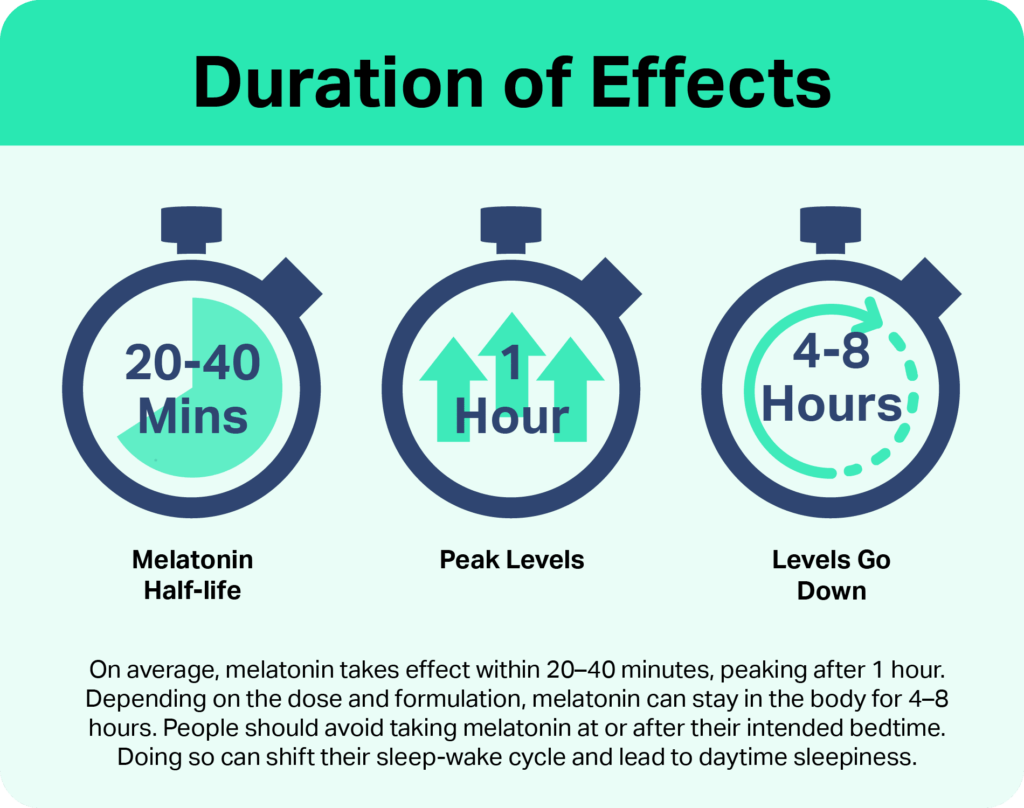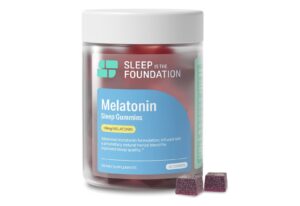How Long Does Melatonin Last?
- The effects of melatonin supplements can last up to 5 hours.
- The composition of the supplement can influence how long it stays in your system.
- How quickly the body absorbs and processes melatonin can change depending on your age and health.
- Melatonin is safe for short-term use but should be used cautiously and under medical guidance.
Melatonin supplements are fast-acting sleep aids that can last up to five hours. However, the exact time melatonin lasts depends on the dose, the formulation , and the individual .
Over the past 20 years, melatonin supplements have greatly increased in popularity in the United States. Some people take melatonin supplements to help with sleep problems such as jet lag or insomnia. Sleep difficulties are quite common in the U.S., impacting nearly half of all Americans.
Although melatonin is often marketed as a natural sleep aid and is generally safe to take , the evidence regarding the sleep-related benefits of the supplement is mixed. Before taking a melatonin supplement as a treatment for difficulty with sleep, it is important to understand how melatonin works, how long it lasts in the body, and the best time to take it.
Get to the root of your sleep problems
Melatonin can help, but it’s best to find the source of your sleep issues. Answer these questions to better understand your sleep.
Melatonin and Your Brain
When evaluating how long melatonin lasts, it is helpful to distinguish between the brain’s naturally produced hormone melatonin and lab-made melatonin supplements. The brain produces melatonin every night to promote sleep . Melatonin supplements are designed to increase the signal of naturally-occurring melatonin.
Naturally occurring melatonin plays a key role in the body’s sleep-wake cycle, a circadian rhythm that follows a 24-hour pattern. Environmental cues such as light from the sun help tune the body’s biological clock. As a result, people feel a natural drive to be active when the sun is up and to sleep when the sun goes down.
When light from a person’s surroundings enters their eyes, this information gets relayed to the pineal gland in the brain. The pineal gland is responsible for increasing melatonin production in response to darkness and decreasing melatonin production in response to light. Melatonin promotes sleep by binding to receptors in the brain and blocking wakefulness signals.
How Long Does It Take for Melatonin to Work?
Melatonin supplements are typically fast-acting and take effect in less than an hour . However, different factors can influence how long it takes for melatonin to work.
In the U.S., synthetic melatonin supplements are widely available for purchase online and in stores without a prescription. Melatonin supplements are usually sold as oral tablets but are also available as suppositories, as skin patches, and in liquid form.
The FDA classifies melatonin as a dietary supplement . This means melatonin sold in the U.S. is not as strictly regulated as prescription and over-the-counter sleep aids. However, health experts consider melatonin to be relatively safe.

Melatonin Dosage and Absorption
Melatonin supplements are available in a variety of doses and formulations in the United States. While variety offers consumers more options, it can make it harder for researchers to study. The dosage and formulation of a specific melatonin supplement can affect how long it takes for the supplement to work.
Researchers have also found that the actual concentrations of some melatonin supplements varied significantly from the labeled concentrations. As a result, the actual time it takes for melatonin to affect the body may be different than anticipated.
A strategy to confirm the accuracy of melatonin labeling is to purchase reputable supplements verified by the United States Pharmacopeia (USP). The USP is a non-profit organization that checks the quality and dosage of supplements.
Fast-Release Melatonin vs. Extended-Release Melatonin
Melatonin is often sold as an oral tablet. Oral tablets are available in different formulations: fast-release, extended-release, or a combination of fast- and extended-release. Fast-release formulations absorb quickly into the bloodstream and typically reach a peak blood concentration after 45 minutes to an hour.
Extended-release formulations significantly delay the release of melatonin and can prolong the supplement’s effects. One small study found that melatonin levels in blood samples from a group of older adults remained elevated above baseline nearly 10 hours after taking an oral dose of combined fast-release and extended-release melatonin.
Extended-release formulations can be helpful for people who have trouble staying asleep during the night. However, extended-release melatonin may also increase the risk of negative side effects like sleepiness the next day.
Individual Characteristics
While there are many studies looking at how quickly melatonin moves through the body, it is important to note that the results can vary from study to study as well as person to person. A systematic review found that many factors can affect how quickly the body absorbs and processes melatonin such as:
- Age
- Caffeine intake
- Being a smoker
- Certain medications
- Illness
Because of these and other potential factors, more research is needed to better understand how quickly melatonin starts working in the body.

How Long Does Melatonin Stay in Your System?
The half-life of melatonin is between 20 and 40 minutes, meaning half of the initial dosage in the body is eliminated after that amount of time. In total, melatonin stays in your system for about four to five hours.
One small study examined melatonin levels in blood samples from a group of healthy male adults after taking an oral 10 milligram dose of the supplement. The researchers found that on average melatonin levels dropped to zero after five hours .
However, a number of factors can affect how long it takes for the body to process melatonin, including a person’s age, the melatonin dose, and whether it is a fast- or extended-release formulation. Further research can offer more insight as to how these and other factors influence how long melatonin stays in the body.
Does Melatonin Make It Hard to Wake Up?
There is a low risk of fast-release melatonin or low doses of melatonin causing side effects such as grogginess after waking up. However, taking higher doses of melatonin or extended-release melatonin may lead to daytime sleepiness or drowsiness in some people. Experts recommend avoiding driving or operating machinery four to five hours after taking melatonin.
Age may also influence the effects of melatonin. Some research suggests melatonin may affect older adults longer than younger people. As a result, older adults may experience drowsiness during the day.
Before taking melatonin, talk with a doctor and discuss the potential side effects and interactions with other drugs you may be taking. The interaction of melatonin with certain medications may cause additional sleepiness.
When to Take Melatonin
Melatonin might be effective for both children and adults who struggle to fall asleep at night. However, when to take melatonin differs between the two age groups.
Adults may benefit from taking melatonin a few hours before their desired bedtime. Melatonin has been shown to help adults fall asleep slightly faster and stay asleep slightly longer.
Melatonin can also be helpful for children with insomnia or difficulty falling asleep if given 30 minutes before bedtime.
When to Avoid Melatonin
Melatonin can be a helpful sleep aid for adults and children in some situations. However, it is always a good idea to talk with a doctor before starting any new sleep aid or dietary supplement. In some cases, it may be best to avoid melatonin.
- Driving or operating machinery: People who need to operate a vehicle or heavy machinery in the next four to five hours should avoid taking melatonin.
- Certain medications: Melatonin can interact with a number of medications. Anyone currently taking prescription medications, over-the-counter medicines, or other supplements should speak with their health care provider before taking melatonin.
- Pregnancy and breastfeeding: There is often a lack of research looking at the effects of dietary supplements on people who are pregnant or breastfeeding. Melatonin is no exception. For expecting parents and people nursing, it may be best to play it safe and avoid taking melatonin.
- Children’s health: Short-term use of melatonin can be safe for children with sleep issues. However, health experts do not recommend giving melatonin to otherwise healthy children or teens to encourage an earlier bedtime.
- Dementia: Melatonin is not recommended for use in people who have dementia.
- Allergic reactions: Some people may find that they have an allergic reaction to melatonin.

Still have questions? Ask our community!
Join our Sleep Care Community — a trusted hub of sleep health professionals, product specialists, and people just like you. Whether you need expert sleep advice for your insomnia or you’re searching for the perfect mattress, we’ve got you covered. Get personalized guidance from the experts who know sleep best.
Medical Disclaimer: The content on this page should not be taken as medical advice or used as a recommendation for any specific treatment or medication. Always consult your doctor before taking a new medication or changing your current treatment.
References
12 Sources
-
Moroni, I., Garcia-Bennett, A., Chapman, J., Grunstein, R. R., Gordon, C. J., & Comas, M. (2021, June). Pharmacokinetics of exogenous melatonin in relation to formulation, and effects on sleep: A systematic review. Sleep Medicine Reviews, 57, 101431.
https://pubmed.ncbi.nlm.nih.gov/33549911/ -
Harpsøe, N. G., Andersen, L. P., Gögenur, I., & Rosenberg, J. (2015). Clinical pharmacokinetics of melatonin: A systematic review. European Journal of Clinical Pharmacology, 71(8), 901–909.
https://pubmed.ncbi.nlm.nih.gov/26008214/ -
National Institutes of Health. (2022, March 1). Use of melatonin supplements rising among adults. U.S. Department of Health & Human Services., Retrieved August 26, 2022, from
https://www.nih.gov/news-events/nih-research-matters/use-melatonin-supplements-rising-among-adults -
Neubauer, D. N. (2022, August 18). Pharmacotherapy for insomnia in adults. In R. Benca & J. G. Elmore (Ed.). UpToDate., Retrieved August 26, 2022, from
https://www.uptodate.com/contents/pharmacotherapy-for-insomnia-in-adults -
Savage, R. A., Zafar, N., Yohannan, S., & Miller, J. M. Melatonin. (2021, August 15). Melatonin. In StatPearls. StatPearls Publishing., Retrieved August 26, 2022, from
https://www.ncbi.nlm.nih.gov/books/NBK534823/ -
Ilahi, S., Berwial, N., & Ilahi, T. B. (2022, April 28). Physiology, pineal gland. In StatPearls. StatPearls Publishing., Retrieved August 26, 2022, from
https://www.ncbi.nlm.nih.gov/books/NBK525955/ -
Owens, J. A. (2022, June 6). Pharmacotherapy for insomnia in children and adolescents: A rational approach. In R. D. Chervin (Ed.). UpToDate., Retrieved August 26, 2022, from
https://www.uptodate.com/contents/pharmacotherapy-for-insomnia-in-children-and-adolescents-a-rational-approach -
National Center for Complementary and Integrative Health. (2022, July). Melatonin: What you need to know., Retrieved August 26, 2022, from
https://www.nccih.nih.gov/health/melatonin-what-you-need-to-know -
Le, J. (2022, June). Drug bioavailability. Merck Manual Professional Version., Retrieved August 26, 2022, from
https://www.merckmanuals.com/professional/clinical-pharmacology/pharmacokinetics/drug-bioavailability -
Gooneratne, N. S., Edwards, A. Y., Zhou, C., Cuellar, N., Grandner, M. A., & Barrett, J. S. (2012). Melatonin pharmacokinetics following two different oral surge-sustained release doses in older adults. Journal of Pineal Research, 52(4), 437–445.
https://pubmed.ncbi.nlm.nih.gov/22348451/ -
Andersen, L. P. H., Werner, M. U., Rosenkilde, M. M., Harpsøe, N. G., Fuglsang, H., Rosenberg, J., & Gögenur, I. (2016). Pharmacokinetics of oral and intravenous melatonin in healthy volunteers. BMC Pharmacology and Toxicology, 17(1).
https://pubmed.ncbi.nlm.nih.gov/26893170/ -
Burgess, H. J., Emens, J. S., Deriy, L. V., Thomas, S. M., & Sharkey, K. M. (2015, October 15). Clinical practice guideline for the treatment of intrinsic circadian rhythm sleep-wake disorders: Advanced sleep-wake phase disorder (ASWPD), delayed sleep-wake phase disorder (DSWPD), non-24-hour sleep-wake rhythm disorder (N24SWD), and irregular sleep-wake rhythm disorder (ISWRD). An update for 2015. Journal of Clinical Sleep Medicine, 11(10), 1199–1236.
https://pubmed.ncbi.nlm.nih.gov/26414986/

















